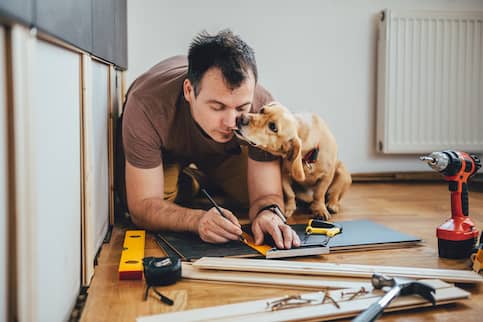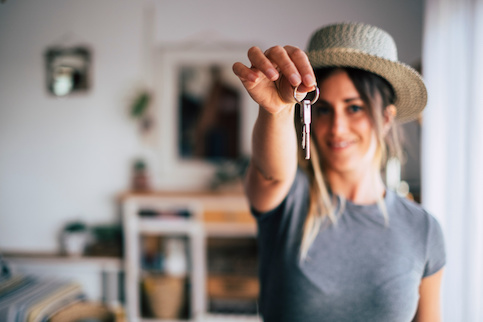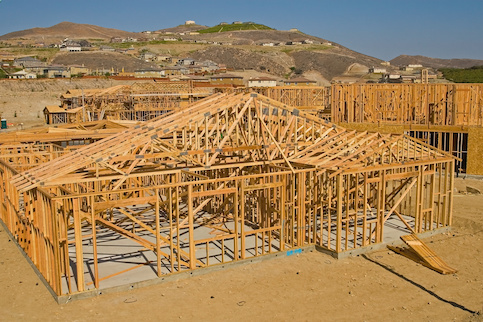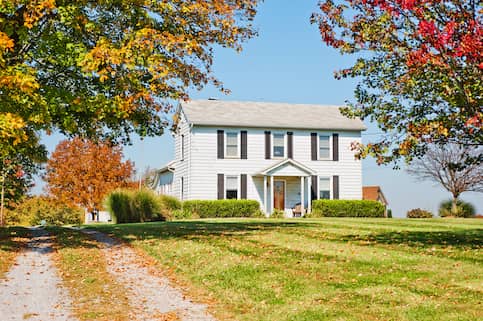When most borrowers buy a home, they need a down payment to get approved for a mortgage. However, veterans benefit from VA loans that often don’t require money down on a home.
With that, the VA loan down payment requirements can be relatively simple. However, there are certain instances when there is a VA loan down payment requirement or when it makes more sense to make one.
Let’s take a look at an overview of what a VA loan is and if making a down payment on a VA loan is a good idea.
VA Loan Overview
A VA home loan is a government loan that’s backed by the U.S. Department of Veterans Affairs (VA). In order to obtain this type of loan, you’ll need to be an active-duty service member or veteran of the U.S. military, National Guard or Reserve. You may also be an eligible surviving spouse. If you’re thinking of applying for a VA loan, make sure that you get a Certificate of Eligibility from the VA.
See What You Qualify For
Buy A Home
Discover mortgage options that fit your unique financial needs.

Refinance
Refinance your mortgage to have more money for what matters.
Tap Into Equity
Use your home’s equity and unlock cash to achieve your goals.
Do VA Loans Require A Down Payment?
The primary benefits of a VA loan include not needing a down payment or paying mortgage insurance. VA loans offer more affordable options to eligible home buyers than other types of home loans, such as FHA and conventional loans. These loans typically require at least 3% – 5% down.
With those loans, you’ll also pay mortgage insurance if you put down less than 20%. While you may not need to make a down payment or pay insurance for a VA loan, you’ll likely be required to pay a VA funding fee.
When A Down Payment Is Required On A VA Loan
It’s uncommon, but sometimes you may have a different VA loan down payment requirement.
- Home appraisal comes in low: Sometimes, the home appraisal value is lower than the agreed sales price. When this happens, you must make up the difference with a down payment if you still wish to purchase the home.
- Loan uses remaining entitlement and is above county limit: Borrowers with full VA entitlement do not have a loan limit. If you currently have a VA loan and are getting another one – meaning you have remaining entitlement, you will have loan limits, based on your county. If your loan is over, you may need to put money down.
Advantages Of Making A Down Payment On A VA Loan
While a down payment isn’t required on a VA home loan, making one has several advantages.
Lower VA Funding Fee
The less money you borrow, the lower the risk of default you pose to a lender. Because of this, the VA charges a lower VA funding fee when you choose to make a down payment. Currently, if you put down anything less than 5%, you’ll pay 2.15% of the loan amount as a funding fee.
However, if you put down 5% – 9.9%, you’ll pay 1.5%, and if you put down more than 10%, you’ll pay 1.25% for the first use of your benefits. The lower your VA funding fee, the lower your closing costs on the loan.
Your funding fee will also depend on the type of buyer you are.
Down Payment | First-Time Buyer VA Funding Fee | Return Buyer VA Funding Fee |
|---|---|---|
0% Down | 2.15% | 3.3% |
5% Down Or More | 1.5% | 1.5% |
10% Down Or More | 1.25% | 1.25% |
Lower Monthly Payment
The larger your VA loan down payment, the less money you borrow. The lower your loan amount is, the lower your monthly mortgage payment is, and the less interest you pay. This lowers your monthly expenses and total costs of buying a home.
Build Home Equity Faster
When you put more money down on the home, you build home equity faster. This is the difference between your home’s value and the outstanding loan amount. Putting money down on the home decreases your loan amount and overall interest charges, allowing you to focus on paying back the principal and building equity faster.
Making a down payment also decreases the risk of going “upside down” on your loan. When this happens, you owe more than the home is worth. This can be frustrating because you can’t sell or refinance the home without drastic measures.
Increased Chances In A Competitive Market
During a seller’s market, buyers must get creative to get sellers to accept their offer. VA loans sometimes turn sellers off because they know you aren’t likely to make a down payment, which can seem risky to sellers.
In addition, you can use a portion of your down payment as earnest money, which is money you promise to the seller to show you’re a serious buyer. If you back out of the sale contract for any reasons not stated in the agreement, the seller keeps the funds. This may help a seller pick you, especially during bidding wars.
Improved Chances Of Loan Approval
When you make a down payment, lenders are more willing to approve your loan because you have “skin in the game.” On the other hand, not putting any money down puts all the risk on the lender. If you default, they may take a larger loss – even with backing from the government.
If you make a VA loan down payment, you decrease your risk of default because you’re more likely to make your payments to avoid losing your investment. This increases your chance of loan approval and securing better rates and terms.
Find A Mortgage Today and Lock In Your Rate!
Get matched with a lender that will work for your financial situation.
Disadvantages Of Making A Down Payment On A VA Loan
There are some downsides to making a VA loan down payment. Here’s what to consider.
Depletes Your Cash Reserves
You could deplete your savings if you use all the funds you have saved. If you lose your job, become ill or your house or car has an emergency, you may not have the funds to handle it, causing financial issues.
You’ll want to keep at least 3 – 6 months of expenses in your savings account to avoid this. If you don’t have that much, consider not making a down payment on a VA loan.
Smaller Budget For Initial Home Repairs
Owning a home means you’re responsible for maintenance and repairs. If you use up your capital on a down payment, your money is tied up and unavailable for use on the home. This could cause delays in home improvements or repairs.
Possible Market Shifts
Saving for a down payment can take a while. If the housing market shifts to favor sellers during that time, or interest rates increase, you may have a tougher time finding a home or getting approved for a mortgage.
How To Decide If You Should Make A Down Payment On A VA Loan
Start by weighing the benefits and drawbacks. This is important on all types of VA loans, including purchase, cash-out and Interest Rate Reduction Refinance loans (IRRRLs).
Making a down payment helps you build equity, lower your monthly payment and have a higher chance of loan approval. But be careful before making too large of a down payment so you don’t deplete your reserves or not have enough money to cover the VA loan closing costs.
Before buying a home, knowing how much house you can afford is important. This ensures you don’t get in over your head.
The Bottom Line: Set Yourself Up For Success With A VA Loan Down Payment
While a VA loan down payment is typically not required, there are times when it makes sense to make one. Putting money down increases your home equity, lowers your payment, decreases interest costs and can make you a more competitive buyer.
If you’re ready to explore your loan options, today.
Find A Mortgage Today and Lock In Your Rate!
Get matched with a lender that will work for your financial situation.

Sam Hawrylack
Samantha Hawrylack is a full-time personal finance and real estate writer with five years of experience. She has a bachelor's degree in finance and an MBA from West Chester University. She writes for publications like BiggerPockets, Angi, Well Kept Wallet, Crediful, Clever Girl Finance, AllCards, InvestingAnswers and many more.












